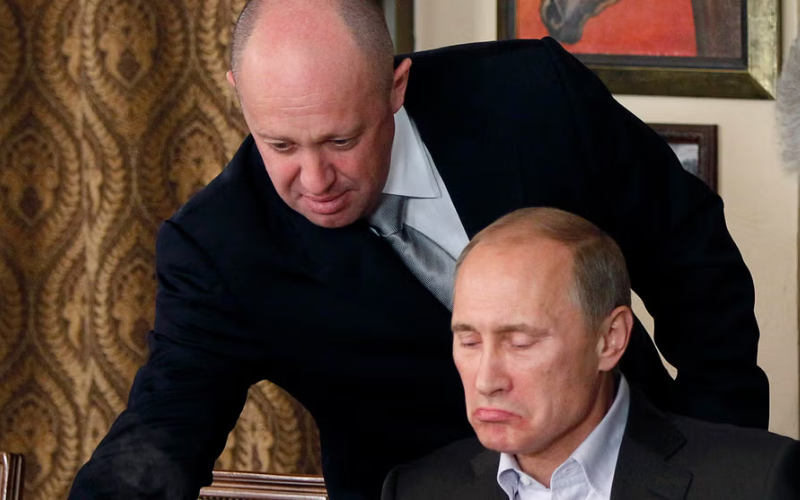Unprecedented challenge reveals a weakness in Russia’s centralized power structure
The recent coup attempt in Russia, led by the Wagner Group, has shaken the country’s political landscape and led analysts to question the stability of President Vladimir Putin’s regime. The armed rebels’ incursion into Russian territory and their march on Moscow directly challenged Putin’s authority and constitute one of the biggest challenges he has faced since taking office in 1999.
The Wagner Group, led by Yevgeny Prigozhin, a longtime Putin acquaintance and a controversial figure known for his involvement in the Kremlin’s catering services, became a decisive force in Russia’s war in Ukraine. Tensions escalated, however, when Prigozhin accused the Russian Defense Ministry of attacking his forces in Ukraine, whereupon he decided to march on Moscow.
The rapid uprising of the Wagner Group succeeded in capturing several Russian cities and destroying military installations. Prigozhin claimed that his troops had entered Russia from Ukraine and faced little resistance at checkpoints manned by young conscripts. The Kremlin’s response reflected the seriousness of the threat, as security was increased in Moscow and Rostov-on-Don, the southern region’s military headquarters that oversees fighting in Ukraine.
The coup attempt raises serious concerns about the stability of the Putin regime and the ongoing war in Ukraine. Although Prigozhin’s actions could be seen as a strategic maneuver to put pressure on official Defense Ministry forces, the use of mercenaries in conflicts without proper oversight poses significant risks. The lack of transparency, accountability, and adherence to international norms threatens the existing international order and global security.
The repercussions of the Wagner Group coup attempt reach beyond Russia’s borders, highlighting the dangers of using mercenaries in conflicts and underscoring the need for comprehensive international mechanisms to address this challenge. The international community must work together to find solutions to prevent the proliferation of mercenaries, which could lead to an increasingly insecure global environment.[1] Notably, the United Nations[2] has already undertaken pertinent initiatives, such as the development of an International Convention against the Recruitment, Use, Financing, and Training of Mercenaries. [3]
Despite Putin’s lack of popularity, this failed coup can be seen as positive for him, as international powers prefer to negotiate with him rather than with unpredictable figures like Prigozhin, whose assumption of power would pose a threat to the world. This preference may be due to Russia’s status as a nuclear-armed state with the largest nuclear arsenal in the world. While maintaining the status quo offers some predictability, the coup attempt underscores the fragility of Putin’s position and highlights the urgency of foresight and risk-reduction strategies.
As the situation continues to evolve, the full implications of the confrontation between the Wagner Group and the Russian military remain uncertain. According to NATO Secretary General Jens Stoltenberg, recent events demonstrate the strategic mistake Putin made in invading Ukraine last year.[4] The current developments in Russia have far-reaching consequences, both regionally and globally, and underscore the need for a comprehensive approach to addressing the challenges posed by mercenary groups and conflicts with state actors.
In summary, the Wagner Group coup attempt has placed President Putin in an unfavorable position that could lead to a decline in his popularity within Russia. Moreover, Mr. Putin’s decision not to hold the Wagner Group accountable for its actions in the coup attempt has created uncertainty not only in military circles but also among influential elites who supported his aggressive stance in Ukraine. This situation highlights the fragility of Russia’s power dynamics and the need for Putin to navigate carefully to ensure his hold on power. National and international reactions to these events will determine the future course of Putin’s regime and his standing in the global community, with the repercussion that may have on peace and stability in Europe and the world.
[1] https://g1.globo.com/jornal-nacional/noticia/2023/06/24/situacao-de-putin-ainda-e-delicada-mesmo-apos-recuo-de-mercenarios-dizem-analistas.ghtml
[2] See, for example, a report to the UN General Assembly by the Working Group on the use of mercenaries: https://www.ohchr.org/en/calls-for-input/report-evolving-forms-trends-and-manifestations-mercenaries-and-mercenary-related
[3] https://www.ohchr.org/en/instruments-mechanisms/instruments/international-convention-against-recruitment-use-financing-and
[4] https://www.nato.int/cps/en/natohq/opinions_212998.htm



